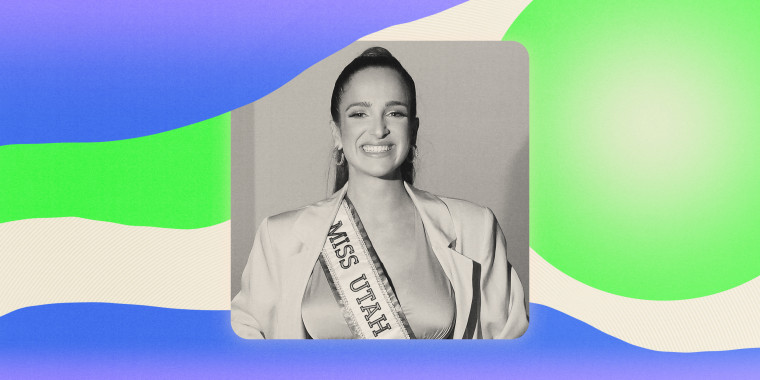[June is Pride Month, and this year we're celebrating by honoring 30 LGBTQ firsts. To see the full list, visit nbcnews.com/pride30.]
Miss Utah, Rachel Slawson, says pageants are an act of counter-culture, a rebellious way to claim space in the world. She rejects the idea that pageants set unrealistic beauty standards and are disempowering. What some see as oppression, she sees as freedom, and she says it’s pageants that helped save her.
Growing up, Slawson, 26, was not encouraged to explore her sexuality or her love of glamour, something pageants offered. She has also experienced mental health issues, homelessness and job loss. Pageants became a positive outlet, and one that required her to take care of herself, give back to her community and stay engaged in the world.
“I just needed something to look forward to. And I loved the glamour...it's fun to embrace your sexuality,” she said. Slawson grew up religious, in a Mormon household, and she said that “having a place where you were actually celebrated for being in a swimsuit and it wasn't degrading was empowering.”
It took five tries and a period of seven years before Slawson was crowned Miss Utah in January of last year; she then went on to make history as Miss USA’s first openly bisexual contestant. Throughout her pageant years, as she would compete on stage, she was also fighting a number of battles in her personal life.
Though she was raised in the upper-middle class — with private school, theater and teachers who said she was “special” — she was in anguish, she said. She described her life at home as turbulent and traumatic, a product, she said, of her parent’s divorce and its ripple effects. Her parents fought, and “every terrible thing said about each other became the new language that I spoke to myself,” she said in a recent TEDx talk.
Slawson said she attempted suicide twice and, at first, rejected medication and care for her bipolar disorder. Unmanaged, her illness led to periods of depression and mania, she said. Throughout it all, she moved to Los Angeles, worked as a flight attendant on private jets and competed.
She’d begun competing in pageants around the time of her parent’s divorce, drawn to them because she was seeking her own space. She didn’t feel at home at her house, or in her religion, and was looking for a community. “I found another community and the pageant family is definitely like a little circus family,” she said.
Though she didn’t win at first, she had fun and found in pageants something that made her feel different from the reality she had been experiencing. “It was an area where I could feel powerful, even though there were so many things about me that I felt like I had no power over,” she said.
In time, Slawson got the help she needed in order to manage her mental health, and that opened up a space for her to find a way back to herself. She founded the I Am Why Project, a self-care community, and became a suicide prevention speaker and crisis counselor. She moved away from Mormonism but embraced Christianity, and began to be more comfortable with the idea of coming out.
Last year, the year she was crowned Miss Utah, was the year where she went as the most herself: out about her queer identity, honest about her mental health struggles, and as someone who no longer needed pageants—or a crown.
“I think every other year I'd been looking to win as my source of validation for everything I've been through,” she said. “Then I realized everything I've been through is why I need to win, so that I can help people realize they don't need that validation.”
Slawson says it’s her work with others that fuels her, and that being given a platform like Miss Utah helps her on her mission to end the stigma around mental health. She says that even though the crown was something she worked for years to win, it doesn’t really belong to her.
“It's about the people that you're representing. You might think it is [about you] because you're the one wearing the crown, but it's really not,” she said. “It’s about the ones who are watching you and learning from you.”
If you or someone you know is at risk of suicide, please call the National Suicide Prevention Lifeline at 800-273-8255, text TALK to 741741 or visit SpeakingOfSuicide.com/resources for additional resources.
